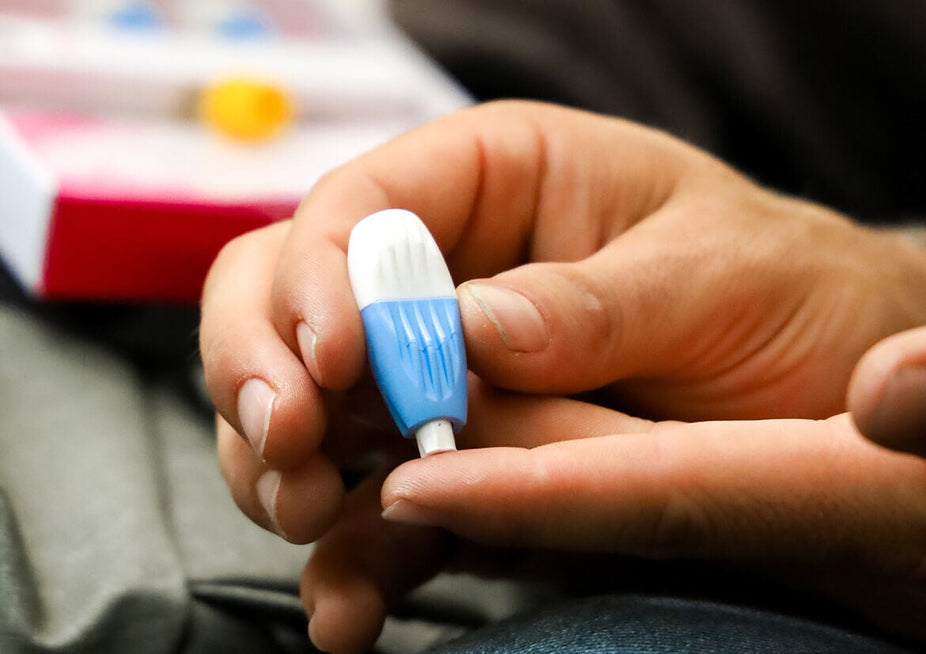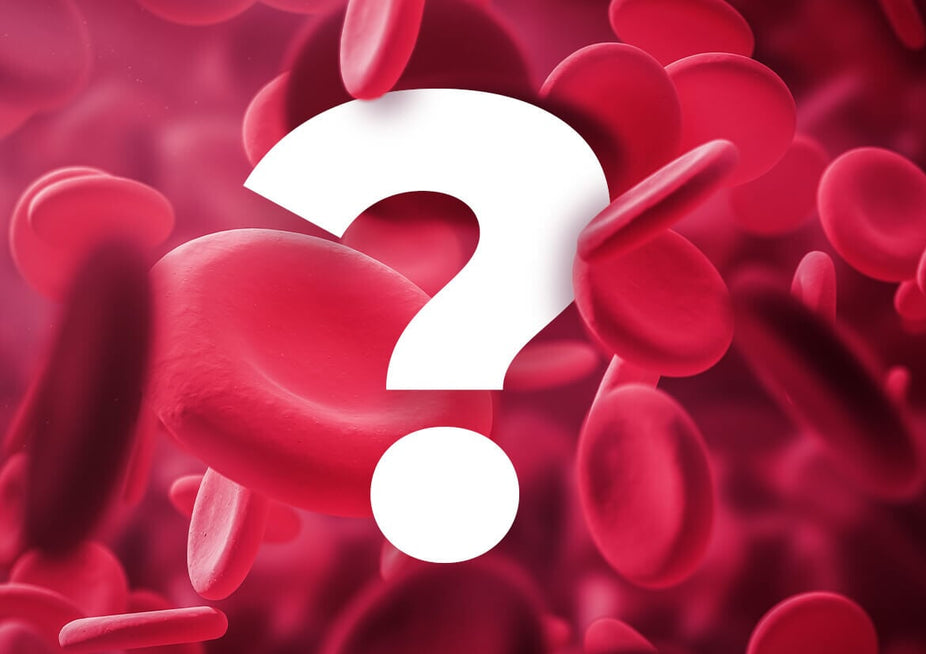What can you find out from a blood test?
Find out what a blood test can tell you about your health and everything you need to know about biomarkers.
Your blood is an invaluable window into your inner health. Let’s take a look at some of the things you can learn from a blood test.
Almost any molecule in your blood can be isolated and measured by a blood test. This means we can study the different types of blood cells and what the blood is transporting, such as nutrients, hormones, and waste products.
A blood test gives you a snapshot of your health at a point in time. You may have a blood test as part of a regular check-up to help investigate symptoms, diagnose a condition, or keep track of your risk of long-term chronic conditions, like heart disease and diabetes.
- What is a biomarker?
- What is in a routine blood test?
- What can a blood test measure?
- Do I have to be ill to have a blood test?
- How often should I have a blood test?
- How can Medichecks help?
What is a biomarker?
Biomarkers are molecules that can indicate whether normal or abnormal processes are happening in your body [1].
When investigating a wide range of symptoms and conditions, your doctor may order a routine blood test. A routine blood test includes looking at several biomarkers to help see if your body is functioning normally.
What is in a routine blood test?
A routine blood test is one that your doctor is most likely to order to investigate a wide range of symptoms and conditions. The two main components of a blood test are a haematology profile and a biochemistry profile.
- Haematology profiles - Haematology profiles assess your blood and identify abnormalities that may indicate a problem. They look at the different components of blood cells, such as your red and white blood cells, and can detect conditions like anaemia, infection, inflammation, or leukaemia.
- Biochemistry profiles - Biochemistry profiles measure substances in the blood or urine, such as hormones, proteins, salt levels, or liver enzymes. Biochemistry tests evaluate the functional capacity of several critical organs, like the liver and kidneys.
What do haematology profiles include?
The purpose of a haematology blood test is to look at the different types of blood cells – namely your red cells, white cells, and clotting cells [2]. They are also commonly known as a full blood count (FBC) or complete blood count (CBC).
Haematology profiles usually include:
- Red blood cells
Examining the size, shape, and distribution of red blood cells can help to identify anaemia. Anaemia is a common condition that can be caused by deficiencies of iron, B12, and folate. The results may explain a lack of energy or general unexplained fatigue.
- White blood cells
Your white blood cells are responsible for identifying and fighting infection [3]. If your white blood cell count is high, it is most likely that your body is fighting an infection. A raised white blood cell count may also be seen with autoimmune conditions, long-term inflammation, and some blood cancers.
If your white blood cell count is low, you can be more susceptible to infections. This could be due to cancer treatment, medications, or autoimmune disorders.
- Clotting cells
Your clotting cells are essential to prevent uncontrolled bleeding, but sometimes they do not work as they should. If you bruise easily, this may be due to an abnormality with your clotting cells.
What do biochemistry profiles include?
The main purpose of biochemistry blood tests is to identify how well your major organs and body systems are functioning.
In a biochemistry profile, biomarkers that are usually tested include [2]:
- Liver function test (LFTs)
Your liver performs many vital functions, from storing glycogen to manufacturing cholesterol and eliminating toxins.
A liver function test will show whether your liver enzymes are raised, which could indicate liver damage. This may be the first sign of liver disease as it can often be asymptomatic in the early stages.
Our Liver Blood Test is a simple way to check your liver function and look for signs of damage from the comfort of your home.
- Kidney function
Your kidneys are responsible for filtering waste products from your body [4]. A kidney function test (which also measures your level of electrolytes) examines how well they are doing their job. If you have raised blood sugar or diabetes, it can be important to check your kidney function.
- Proteins
The levels of protein in your blood, particularly albumin and globulin, can help identify liver and kidney disease, or be a sign of malnutrition.
- Uric acid
Uric acid is a waste product formed when the body breaks down the purines found in food. Having high levels of uric acid raises your risk of kidney stones and gout [5].
- Diabetes
A diabetes test can either be a snapshot of the amount of glucose in your blood at a point in time (a blood glucose test) or can look at the average amount of glucose in your blood over three months (HbA1c test).
Raised blood sugar can be a sign that you are becoming insulin resistant, which means that your body struggles to get the sugar you eat into your cells for energy. Eventually, this may lead to diabetes, which raises your risks of cardiovascular disease, cancer, and Alzheimer’s.
- Lipid profile (cholesterol test)
Your blood lipids are fats that circulate in your blood – you may know them as LDL (bad) cholesterol, HDL (good) cholesterol, and triglycerides. High levels of LDL cholesterol and triglycerides raise your risk of heart disease, especially if you have low levels of protective HDL cholesterol [6].
- Iron status
Your iron status is a measure of iron in your blood as well as your body's capacity to absorb iron. This test might pick up iron deficiency anaemia or haemochromatosis (iron overload syndrome) - an inherited condition that means that the body absorbs too much iron from your food.
- Bone health
A routine blood test will look for levels of calcium and phosphate - essential minerals needed for strong bones and teeth as well as muscle (including heart) function. This test will usually include albumin and alanine phosphatase (ALP) too.
What can a blood test measure?
There are several other types of blood tests that look at different body systems and markers of health.
Other markers of health that can be tested include:
- Endocrinology
Endocrinology tests measure the levels of hormones in your blood. The type of test you are taking will depend on what you or your doctor is hoping to find out but can include tests for thyroid function, reproductive hormones, and pituitary hormones.
- Immunology
Immunology tests look for and measure antibodies produced by your immune system to overcome a certain infection. They can also screen for autoimmune disease - when the body produces antibodies against its tissues.
- Microbiology
Microbiology tests look for evidence of infection in the body, such as bacteria, viruses, or fungi.
Often, a blood sample will be placed in a dish to see if any microorganisms (bugs) grow and whether they are sensitive to treatment. With bacterial infections, this can help to determine which antibiotics will be most effective and detect any patterns of resistance.
Do I have to be ill to have a blood test?
Although blood tests are an invaluable tool to help diagnose a condition or investigate symptoms, you don’t have to be ill to benefit from a blood test. Blood tests are an excellent screening tool for picking up health risks.
Other reasons why people have blood tests:
- Investigate a family history of a particular condition (such as heart disease)
- Understand health risks
- Optimise nutrition
- Optimise sports performance
- Understand fertility
- For occupational reasons (immunity tests and exposure to work-related toxins)
How often should I have a blood test?
Some tests should be done as soon as possible, like if you think you have an infection or condition, or if you're experiencing symptoms. Once they’re done, and the infection or condition has been ruled out, there’s no reason for you to repeat that test any time soon.
For most healthy people, checks are advisable to keep on top of your healthcare. You can do this by monitoring your diet and lifestyle, key measurements like your weight and waist circumference and by monitoring your blood biomarkers.
Diagnostic tests
If your blood test has diagnosed a condition and you are no longer symptomatic, you may not need any follow-up tests. If your test results were inconclusive, your doctor may recommend a repeat test in the next few weeks or months.
Monitoring tests
Blood tests can monitor a condition. Regular monitoring can help to manage a condition through medication and/or lifestyle changes.
Sometimes, you may have a blood test after starting a medication. This could be to check the dosage is correct or make sure that the drug is not causing any damage to the organs, like the liver or kidneys.
Optimising tests
People who want to optimise their health are not usually ill but are aiming to meet certain health goals through their diet or a fitness programme.
Someone seeking to optimise their sports performance may choose to test at different points in their training cycle to see how well they are adapting to the additional training stresses.
People looking to optimise their diet and lifestyle may want to test before and after they make significant changes, like becoming vegan or giving up alcohol. Some changes may show up in your blood quite quickly, and others may take longer. In general, it is best to wait at least three months for any changes to be seen.
How can Medichecks help?
Here at Medichecks, we have a range of blood tests to help you, whether it be for establishing a health baseline or monitoring a condition (such as a thyroid disorder).
For help in choosing a test, read about our top six blood tests to buy, or give our test finder a try.
References
- Strimbu, K. and Tavel, J., 2010. What are biomarkers?. Current Opinion in HIV and AIDS, 5(6), pp.463-466.
- uk. 2022. Blood tests - Examples. [online] Available at: <https://www.nhs.uk/conditions/blood-tests/types/> [Accessed 21 February 2022].
- Nicholson, L., 2016. The immune system. Essays in Biochemistry, 60(3), pp.275-301.
- uk. 2022. [online] Available at: <https://www.nhs.uk/Livewell/Kidneyhealth/Documents/kidney%20guide.pdf> [Accessed 21 February 2022].
- com. 2022. Uric acid levels: High and low, symptoms, and relation to gout. [online] Available at: <https://www.medicalnewstoday.com/articles/uric-acid-level> [Accessed 21 February 2022].
- Centers for Disease Control and Prevention. 2022. LDL and HDL Cholesterol: “Bad” and “Good” Cholesterol. [online] Available at: <https://www.cdc.gov/cholesterol/ldl_hdl.htm> [Accessed 21 February 2022].







